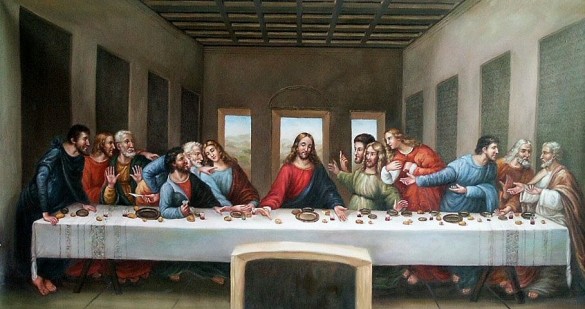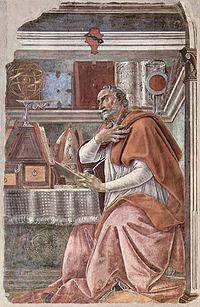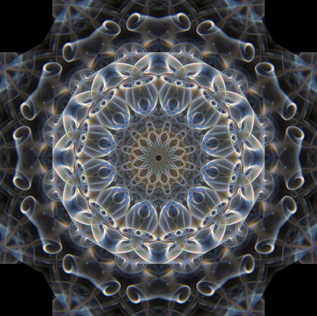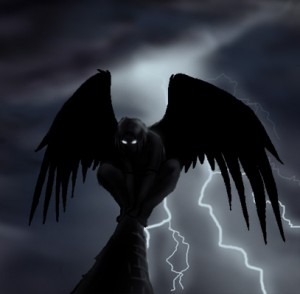
The loudest voices of the lucid dreaming movement cite pleasure, power, and fulfilling fantasies as among the benefits of becoming more aware in our dreams. Unfortunately this popular expression has added fuel to the smoldering and historic distrust of dreams by many contemporary Christians, who are told that dreams can only be temptations of the Devil. However, lucid dreaming also has a modern development in Christian spirituality that is largely unknown but growing in influence.
But first, some background in the history of Christianity and dreams is needed.
The Awkward History of Dreams and Christianity
The New Testament is chock full of dreams. Dozens of dreams, in fact. So is the Old Testament, for that matter. From Joseph’s dream that told him of the divine importance of Mary’s surprising pregnancy (Book of Matthew), to Paul’s dreams that inspired his missionary work in Macedonia (Book of Acts), dreaming is clearly depicted as connecting normal people to the divine for the purpose of guidance, courage-building, and reassurance.
By the way, some of the Old Testament sources include Ecclesiastes 5:3, Psalms 73:19, Isaiah 29:7, Deuteronomy 13, Genesis 28 and Joel 2:28.

Interestingly, Jesus is not reported to have visionary dreams. As Christian theologians have commented for hundreds of years, “Why would God need to send a message to himself?”
Long after the life of Jesus, dreams continued to be an inspiration to theologians, priests and monks. For example, Saint Augustine of Hippo (d. 430 C.E.) left several writings clearly expressing his opinion that dreams can come from several sources: from the divine, from below, or simply from everyday life.
This folk psychology still has parallels in several dream theories, for instance that dreams can reflect, in turn, our waking concerns (see William Domhoff), our socially tabooed—and perhaps unhealthy–desires (see Sigmund Freud), as well as expressions from our higher Self (see Carl Jung).
St. Augustine also discusses lucid dreaming in one of his letters – as evidence of life after death. Religion and dream scholar Kelly Bulkeley describes this dream narrative in his book Dreaming Beyond Death: a guide to pre-death dreams and visions. He recounts Augustine’s story of Gennadius, who dreams of a city of angels. In a subsequent dream, a young man approaches him and asks several questions:
The young man went on to ask, “Where is your body now?”
“In my bed,” Gennadius answers.
“Do you know,” the youth asked, “that the eyes in this body of yours are now bound and closed, and at rest, and with these eyes you are seeing nothing?”
“I know it,” Gennadius answers.
“What then,” the young man continued, “are the eyes with which you now see me?” Unable to discover what to answer to this, Gennadius fell silent.
In this moment of uncertainty and paradox, the youth finally revealed to Gennadius the deeper truth of his experience. “As while you are asleep and lying on your bed these eyes of your body are now unemployed and doing nothing, and yet you have eyes with which you behold me, and enjoy this vision, so, after your death, while your bodily eyes shall be wholly inactive, there shall be in you a life by which you shall live, and a faculty of perception by which you still perceive. (Bulkeley, 2005, p. 27)
The Church Turns Away from Dreams
Despite Christianity’s rich intwining with dreaming, the Church began to turn away from dreams in the Middle Ages. The historic reasons for this movement are complex and still mysterious, as Bulkeley recounts in his 2009 resource Dreaming in the World’s Religions. Certainly it did not help that Thomas Aquinas (1225-1274), a medieval religious scholar, warned in Summa Theologica that dreams can contain temptations and that these dreams are impossible to differentiate from the occasional dreams that come from God. (Bulkeley, 2009, p. 183). Note that Thomas Aquinas did not think that having impure dreams was a sin, but a reflection of a lack of spiritual purity in waking life. In other words,to the relief of Christian dreamers everywhere, sexual dreams are not seem as being sinful in themselves.
Martin Luther, the father of the protestant movement, also had a bone to pick with dreams, suggesting that they were superfluous, at best. Interestingly, Luther complained of many dreams, visions and nightmares, but he rejected their hold on truth unless they mirrored the details of the Bible. This attitude is probably the most decisive blow against the spiritual value of dreams in the modern Christian world.
St Jerome may have also played a role when he first translated the Bible from Aramaic to Greek, but scholars do not agree on his level of influence. Read more about St Jerome and dream interpretation here.
Dreaming and Christian Mysticism
Today, there are a growing number of Christian writers who value dreams, although their influence is still minor compared to that of Martin Luther and the general idea that studying dreams is sinful. Remember that nowhere in the Bible does it state that dreams come from the Devil or demons in order to tempt humanity; this is an idea that blossomed later in the history of the Church.
Christian dream interpretation is alive and well, as is evidenced by these recommended books by Christian dream workers and scholars Morton Kelsey, John Sanford, James Hall, and Louis Savary and Patricia Berne.
These authors do not all espouse the same message, but they generally agree that dreams can be interpreted spiritually and lead to self-knowledge, inspiration, and greater life enjoyment as a Christian living in the modern world.
Christianity and Lucid Dreaming Today
Likewise, — and boy it took me a while to get around to this point — several prominent lucid dream researchers have approached their extraordinary experiences from the vantage of Christian spirituality. These scholars have shown that the major themes of Christian gnosis can naturally be explored within the safe space of the conscious dream.
Lucid Dreams As Mystical Experience

Psychologist Scott Sparrow is a good place to start because his 1977 book about lucid dreaming –Dawning of the Clear Light, — is deeply spiritual in structure. Sparrow was inspired by self-styled mystic and psychic Edgar Cayce, who suggested that the highest state of the human soul is the awareness of oneness with God.
Cayce writes, “It is for that purpose that He came into the earth; that we, as soul-entities, might know ourselves to be ourselves, and yet one with Him (3003-1).
In this vein, what Sparrow has espoused, and was joined by other lucid dreaming pioneers such as Patricia Garfield in her book Pathway to Ecstasy, is that lucid dreaming offers a chance to participate in a true mystical state. This idea has gained ground with the support of the fourth wave of American psychology (also called transpersonal psychology), and is further influenced by Eastern perspectives of spirituality, especially Tibetan Buddhism. In this tradition, communion with God is just not a theory for the afterlife, but a fruit of spiritual practice that includes prayer, meditation, and lucid dreaming.
Patricia Garfield (1977) puts it succinctly: “lucid dreams are microcosms of mystic experience.”
The Experience of Light in Lucid Dreams
One of the most common mystical experiences in Christian lucid dreams is the experience of divine light. Reverend George Gillespie, a practiced lucid dreamer, has outlined how some experiences of light involve feelings of union, ineffability, and awe – he calls this “the fullness of light.” The notion of light being connected to God is an old one (“and then there was light!”), and is discussed by many lucid dreaming mystics.
Psychotherapist Ken Kelzer describes the correlation here in his fabulous book The Sun and the Shadow (1987):
More than anything else, the appearance of the light with its endless variations and the countless ways in which it works its way in and out, lover and under and through the fabric of such a lucid dream, eventually convinces the dreamer of the age-old philosophical/metaphysical premise that the essence of the material universe is light, and that matter and energy and light are, indeed, interchangeable…
I am convinced that the more anyone follows the path of the lucid dream, the more he or she will see that our prime human purpose in this world is to become enlightened, to fill ourselves with the essence of light, and to eventually become ONE with THE LIGHT. (al caps in the original).
Our traditional Judeo-Christian scriptures have prepared the way for this inner synthesis through such teachings as “God is Light,” “God is Love,” “and “God is One.” The lucid dream state can carry us into the experience of these ancient truths, demonstrating how light and love are one, and how the ultimate grace is to be living in a state of mind where we are steeped in the oneness of love and light. (p 221).
The Brighter the Sun, the Darker the Shadow
 Another common theme elaborated by Christian lucid dreamers is the truism that any spiritual path is beset by dangers. Seekers have noticed that mystical lucid dreams also seem to bring on dark and troubling unconscious material. Ken Kelzer reminds us the lucid dreaming path insists that seekers must face the “unresolved dark aspects” of inner life (p. 82). This is the work of facing one’s own human nature, and it is a part of any mature psycho-spiritual practice.
Another common theme elaborated by Christian lucid dreamers is the truism that any spiritual path is beset by dangers. Seekers have noticed that mystical lucid dreams also seem to bring on dark and troubling unconscious material. Ken Kelzer reminds us the lucid dreaming path insists that seekers must face the “unresolved dark aspects” of inner life (p. 82). This is the work of facing one’s own human nature, and it is a part of any mature psycho-spiritual practice.
That’s why Kelzer and many other experienced psychologists recommend taking lucid dreaming seriously, and with precautions. It’s important to have a safe home environment, the time to spend on inner work, and if possible, an experienced guide who has tread this path before.
By the way – here’s where to read more about my approach to dealing with these kinds of troubling lucid nightmares, regardless of religion or belief system.
Ultimately, it is up to the dreamer to decide if lucid dreaming as a spiritual practice is worth pursuing. I am personally convinced that the practice of lucidity, if cultivated with respect for the dreamworld, humility of ego, and courage of heart, can enliven any dreamer who is looking for more first-hand gnosis of mystical experience.
Neat. These interpretations of Christianity are definitely translatable right into Buddhism.
Outstanding overview, Ryan. I’ll help spread it around…
thanks ya’ll for the feedback. I really should have titled it “Christian Mysticism and Lucid dreaming” — the lucid dreaming traditions described here fit more in with the personal experience of the divine rather thanthe classic questions regarding faith or the nature of evil.
Thanks for this =] I find it interesting as many Christians consider lucid dreaming as demonic or whatever, when others just see it as experimenting with the Self.
I had a lucid dream the other night after not having one for years and all the next day I knew the next time I had one, I wanted to find a church. The very next night I became lucid in front of a church. My conscious thought to myself in the dream was “I want to find Jesus.” That was about three weeks ago. So… still waiting for the next lucid dream.
Hi my name is Evy! I have been having lucid dreams for years where I can not move or speak!!! Last was the worst one cause there was more 2 the dream then normal! In addition to not being able 2 move, I felt like I was being crushed and pressure all over my body and my heart was racing. I at one point was falling into darkness and I was hot! When I woke up it took awhile for me to move my body again. Slowly I was able 2 wiggle my fingers and toes!!! I believe in god and I believe in the devil. I pray every night and last night I felt very close to god and my beliefs! I feel that because I was so in tune with my faith that it made vulnerable! I feel that evil was trying 2 test me! Has anyone out there experinced something like this?????
This is known as sleep paralysis, its a common occurence with lucid dreams, and even with people who have never experienced them. It happens when the body gets ready for sleep so shuts down to reduce movement during dreams, yet the conscious mind is still awake, thus experiencing paralysis and strange feelings. Its something totally natural and not linked to demons or evel spirits.
thanks Craig for the reminder! this important fact calms many but the scientific explanation often does not stop the encounters for many. there’s a gap between science and spiritual encounters that our culture has been slow to address. I discuss this more here: http://thedreamtribe.com/sleep-paralysis-fear-and-spirituality/
Yes i def felt what u felt in lucid dreaming..i have so many stories that it will blow your mind
hey Evy, sounds like you experience sleep paralysis! I have had it too – (in fact I wrote a book about it). this is a kind of dream in which you’re lucid but can’t move and feel like you’re being suffocated or pressed down upon. These experiences are often filled with religious content because they are so scary.
Here’s more information: http://dreamstudies.org/2010/01/22/sleep-paralysis-treatment-wake-up-cant-move/
and:
http://dreamstudies.org/2010/04/29/9-ways-to-wake-up-from-sleep-paralysis/
I have had a special dream that i can not make of its meaning about jesus and satan two seperate dreams they spoke to me and i understood what they said but why me